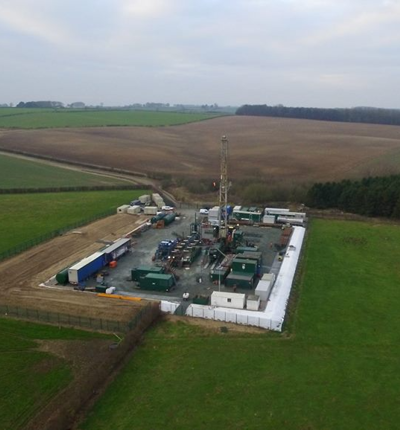
Planning inspector’s decision to allow oil production in Biscathorpe in Area of Outstanding Natural Beauty quashed after concession from Secretary of State
The decision to allow an oil drilling operation in the Lincolnshire Wolds Area of Outstanding National Beauty (AONB) has been quashed following a concession from the Secretary of State weeks after a landmark Supreme Court judgment on fossil fuel production.
Posted on 11 July 2024
Campaigner Mathilda Dennis, supported by SOS Biscathorpe, brought a challenge against the planning inspector’s decision to overturn Lincolnshire County Council’s refusal of permission for exploratory oil drilling and production in Biscathorpe, Lincolnshire, at the end of 2023. The High Court hearing was held in June 2024 and the group were awaiting judgment.
But following a landmark Supreme Court ruling which halted a similar plan for oil production in Surrey, defendants the Secretary of State for Levelling Up, Housing and Communities (under the Conservative administration) and Egdon Resources accepted an invitation from solicitors on Leigh Day’s environment team to concede the case.
Campaigners from SOS Biscathorpe - who are supported by green campaigner and Ecotricity founder Dale Vince - say that this concession shows the wider ramifications for fossil fuel planning decisions as a result of the Supreme Court’s decision, which found that decision-makers are now required to include the impact of downstream emissions (emissions from burning the oil) in Environmental Impact Assessments before giving their decision.
In 2021, Lincolnshire County Council refused Egdon Resources (now owned by US-based group Heyco Energy) permission for further exploratory drilling and 15 years of oil production in the Lincolnshire Wolds AONB after exploratory drilling in 2018 had failed to locate the target reserve.
However, this decision from the council was overturned by the Secretary of State for Levelling Up, Housing and Communities (Michael Gove at the time) in November 2023 following an appeal by Egdon Resources. This was despite the Secretary of State’s planning inspector having acknowledged that the development would have ‘adverse impacts’ on the landscape, that it contravened local planning policy, and that the small and uncertain quantity of oil that it would ultimately produce might be exported.
SOS Biscathorpe, represented by Leigh Day, Estelle Dehon KC and Dr Lois Lane of Cornerstone Barristers, argued that the negative impact of oil extraction on the landscape and on climate crisis outweighed any claims that the site’s uncertain and negligible oil output would contribute to national energy security.
The Lincolnshire Wolds is home to ecologically important chalk streams, into which treated surface water from the proposed drilling site would have been released. These globally rare habitats support some of the UK’s most vulnerable plants, as well as iconic native species such as otter, vole and kingfisher.
In June 2024, the Supreme Court found that planning permission for a similar oil production site at Horse Hill in Surrey was unlawful, with Leigh Day representing campaigner Sarah Finch of Weald Action Group who put forward the claim. It ruled that permission for fossil fuel production should not be granted unless a planning authority has properly assessed the climate impact of the project, including the downstream greenhouse gas emissions that would inevitably come from the use of the fuel.
Following the defendants’ concession in the Biscathorpe case, the 2023 decision to allow further exploratory drilling and oil production in the area will be quashed.
Amanda Suddaby from SOS Biscathorpe said:
“We are delighted that 10 years of hard-work and campaigning have finally paid off, and it was also encouraging to see that these very senior judges seemed to recognise and value the importance of public participation in addressing the enormous issue of climate crisis. Our hope now is that this paves the way to a full and proper understanding of the great harm that each and every new fossil fuel development represents.”
Mathilda Dennis said:
“We’re delighted that all the hard-work and campaigning over the last 10 years has finally paid off, not just for the beautiful area of Biscathorpe, but we hope that it will also help & encourage other groups fighting similar battles; on the back of the Finch ruling and now also SOS Biscathorpe, it is clear that the unequivocal link between fossil fuel extraction and climate crisis can no longer be ignored.”
Green industrialist, Dale Vince who supported the campaign to prevent drilling in Biscathorpe said:
“In its dying days, the fossil fuel obsessed Conservative government were forced to accept they were breaking the law by ignoring the impact of their planning decisions on the climate crisis.
“The Finch ruling has the potential to halt future drilling for fossil fuels because decision-makers are now required to include the impact of burning the fossil fuels themselves in Environmental Impact Assessments. Which ought to be simple common sense. It’s a legal ruling now instead and will have a big impact on Britain’s green transition.”
Leigh Day solicitor Julia Eriksen, who represents the campaigners, said:
“We are hugely pleased that this case has resulted in a positive outcome and are proud to represent a local community group in their continuing fight against fossil fuel development. Our clients put forward strong arguments that the Secretary of State acted unlawfully and irrationally in overturning Lincolnshire County Council’s decision to refuse planning permission. This case illustrates the significant implications of the Supreme Court’s landmark judgment on fossil fuel production in June, which ruled that planning inspectors must take into account the downstream emissions from burning fuel when considering fossil fuel applications. We hope this success in Lincolnshire is a positive sign for similar cases still before the courts.”

Historic Supreme Court judgment rules planning permission for oil production at Horse Hill, Surrey is unlawful and must be overturned
In a ground-breaking judgment the Supreme Court has today, Thursday 20 June 2024, ruled that planning permission for fossil fuel production should not be granted unless and until a planning authority has properly assessed the climate impact of the project and specifically assessed the downstream greenhouse gas (GHG) emissions that will inevitably arise from the combustion of the fuel.



